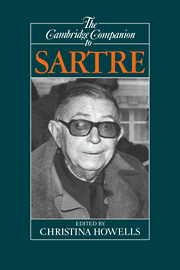Book contents
- Frontmatter
- Introduction
- Part I Phenomenology and existentialism
- Part II Psychology and ethics
- 4 Sartre's moral psychology
- 5 Understanding the committed writer
- 6 Sartrean ethics
- Part III History and structure
- Conclusion: Sartre and the deconstruction of the subject
- Appendix; Hegel and Sartre
- Bibliography
- Index
5 - Understanding the committed writer
from Part II - Psychology and ethics
Published online by Cambridge University Press: 28 May 2006
- Frontmatter
- Introduction
- Part I Phenomenology and existentialism
- Part II Psychology and ethics
- 4 Sartre's moral psychology
- 5 Understanding the committed writer
- 6 Sartrean ethics
- Part III History and structure
- Conclusion: Sartre and the deconstruction of the subject
- Appendix; Hegel and Sartre
- Bibliography
- Index
Summary
“A life develops in spirals: It always passes through the same points, but at different levels of integration and complexity” (CRD I, p. 71). This observation, which underpins Sartre's synthesis of biographical and historical methods in studying the individual and society, might also apply to the preoccupation with committed writing that characterized his own life and work. The reader cannot fail to note the persistence and the far from linear development of the concepts and methods which articulate that preoccupation. The range of concepts itself promises complexity. Psychological, moral, social, political, historical, linguistic, literary, and aesthetic issues must all be integrated through a correspondingly intricate method that draws its inspiration, without lapsing into eclecticism, from a number of different intellectual traditions. The tracing of the spiral is fascinating, frustrating, and exemplary - fascinating because of the commitment and tenacity of Sartre's arguments, frustrating because those arguments reach no conclusion, exemplary because the inconclusiveness is itself inherent in the problem analyzed and in the method of analysis: Sartre's open-ended writing itself enacts an open dialectic.
Two of the major theoretical points through which Sartre's spiral passes are Qu'est-ce que la littératuie? (1947), usually taken to offer the classic description of "committed" literature, and "Questions de méihode" (i960), which presents a more complex view of the interaction of individual, society, and history, prescribes a method for revealing the dialectical relationship of social conditioning and individual project, and prepares the reader for the potentially surprising claim that a writer as apparently uncommitted as Flaubert may be considered to be "engagé."
- Type
- Chapter
- Information
- The Cambridge Companion to Sartre , pp. 140 - 177Publisher: Cambridge University PressPrint publication year: 1992
- 5
- Cited by

